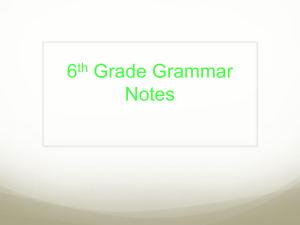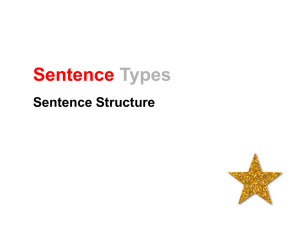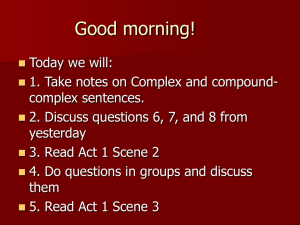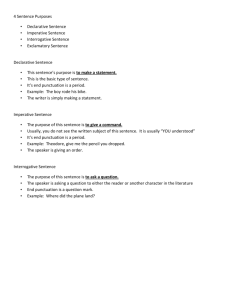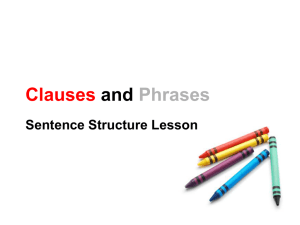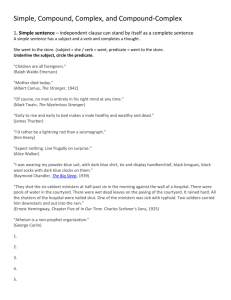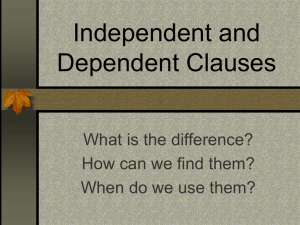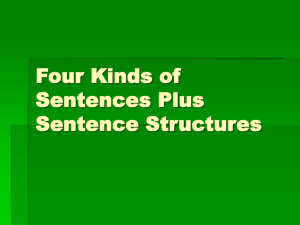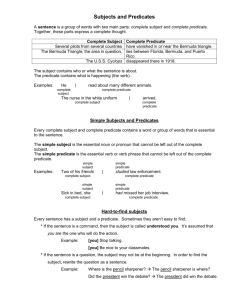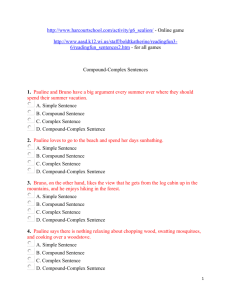Clause Cheatsheet
advertisement
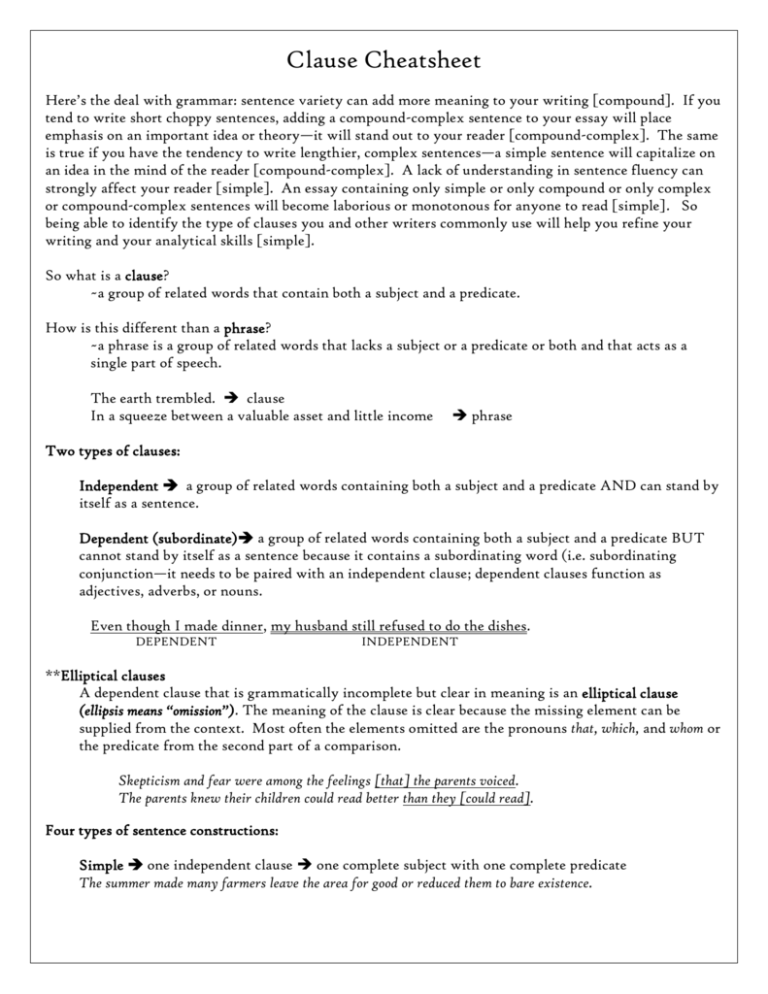
Clause Cheatsheet Here’s the deal with grammar: sentence variety can add more meaning to your writing [compound]. If you tend to write short choppy sentences, adding a compound-complex sentence to your essay will place emphasis on an important idea or theory—it will stand out to your reader [compound-complex]. The same is true if you have the tendency to write lengthier, complex sentences—a simple sentence will capitalize on an idea in the mind of the reader [compound-complex]. A lack of understanding in sentence fluency can strongly affect your reader [simple]. An essay containing only simple or only compound or only complex or compound-complex sentences will become laborious or monotonous for anyone to read [simple]. So being able to identify the type of clauses you and other writers commonly use will help you refine your writing and your analytical skills [simple]. So what is a clause? ~a group of related words that contain both a subject and a predicate. How is this different than a phrase? ~a phrase is a group of related words that lacks a subject or a predicate or both and that acts as a single part of speech. The earth trembled. clause In a squeeze between a valuable asset and little income phrase Two types of clauses: Independent a group of related words containing both a subject and a predicate AND can stand by itself as a sentence. Dependent (subordinate) a group of related words containing both a subject and a predicate BUT cannot stand by itself as a sentence because it contains a subordinating word (i.e. subordinating conjunction—it needs to be paired with an independent clause; dependent clauses function as adjectives, adverbs, or nouns. Even though I made dinner, my husband still refused to do the dishes. DEPENDENT INDEPENDENT **Elliptical clauses A dependent clause that is grammatically incomplete but clear in meaning is an elliptical clause (ellipsis means “omission”). The meaning of the clause is clear because the missing element can be supplied from the context. Most often the elements omitted are the pronouns that, which, and whom or the predicate from the second part of a comparison. Skepticism and fear were among the feelings [that] the parents voiced. The parents knew their children could read better than they [could read]. Four types of sentence constructions: Simple one independent clause one complete subject with one complete predicate The summer made many farmers leave the area for good or reduced them to bare existence. Compound at least two independent clauses a minimum of two pairs of one complete subject with one complete predicate Last July was hot, but August was even hotter. Complex at least one dependent clause and only one independent clause one complete subject with one complete predicate AND a minimum of one complete subject with one complete predicate and a subordinating word Rain finally came, although many had left the area by then. Compound-Complex a minimum of two pairs of one complete subject with one complete predicate AND a minimum of one complete subject with one complete predicate and a subordinating word Even though the government aid finally came, many people had already been reduced to poverty, and others had been forced to move. Coordinating conjuction and, or, for, nor, so, but, yet connect words or word groups of the same importance; coordinating conjunctions do not subordinate. However, in addtion to connecting two independent clauses (with the help of the comma), they can be used to create compound subjects or compound predicates which is not the same as a compound sentence. Subordinating conjuction after, although, as, as if, as long as, as though, because, before, even if, even though, if, if only, in order that, now that, once, provided, rather than, since, so that, till, than, that, though, unless, until, when, whenever, whether, where, wherever, whereas, while connect words or word groups of unequal importance; thus, creating complex or compound-complex sentences. Conjunctive adverbs also, accordingly, as a result, besides, certainly, consequently, finally, further, furthermore, hence, however, in addition, in comparison, in contrast, incidentally, in fact, instead, likewise, meanwhile, moreover, nevertheless, next, nonetheless, now, otherwise, similarly, still, then, thereafter, therfore, thus, undoubtedly relates only main clauses, not words, phrases, or subordinate clauses. Conjunctive adverbs describe the relation of ideas in two clauses, and, like most adverbs, they can move around in their clause. In contrast, conjunctions bind two clauses into a single grammatical unit, and they cannot be moved. Exercise Mark the independent clauses and dependent clauses in the following sentences. Identify each sentence as simple, compound, complex, or compound-complex. 1. Joseph Pulitzer endowed the Pulitzer Prizes. 2. Pulitzer, incidentally, was the publisher of the New York newspaper The World. 3. Although the first prizes were for journalism and letters only, Pulitzers are now awarded in music and other areas. 4. For example, Berke Breathed won for his Bloom County comic strip, and Roger Reynolds won for his musical composition Whispers Out of Time.
